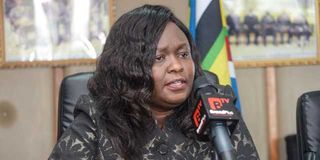Premium
Ruto picks former PS for Central Bank deputy governor

Dr Susan Koech. The Central Bank of Kenya (CBK) is expected to have its second deputy governor following the nomination of Dr Koech to the position by President William Ruto.
What you need to know:
- The Central Bank of Kenya (CBK) is expected to have its second deputy governor following the nomination of Dr Susan Koech to the position by President William Ruto.
- Her name has already been transmitted to the National Assembly and Senate for vetting.
- Lawmakers will have 28 days to vet and approve or reject her nomination once they resume their sitting on Tuesday after a long Christmas recess.
The Central Bank of Kenya (CBK) is expected to have its second deputy governor following the nomination of Dr Susan Koech to the position by President William Ruto.
Her name has already been transmitted to the National Assembly and Senate for vetting meaning that lawmakers will have 28 days to vet and approve or reject her nomination once they resume their sitting on Tuesday after a long Christmas recess.
Dr Koech, previously the Tourism and Wildlife Principal Secretary, had been charged over the Sh55.8 billion Arror-Kimwarer dam scandal before the Director of Public Prosecution dropped the case in 2021.
CBK Governor Dr Patrick Njoroge and his deputy Ms Sheila M’Mbijiwe were first appointed by former President Uhuru Kenyatta in June 2015.
Their terms were renewed for another four years in June 2019.
This was despite Ms M’Mbijiwe attaining the mandatory retirement age of 60 in March 2018, which in effect should have paved the way for her exit from the bank.
Audit query
The lack of a deputy governor at the Central Bank of Kenya has been an audit query over the years.
The Office of Auditor-General, in its audit reports tabled in Parliament, faulted the former President for violating the law by failing to appoint another deputy governor.
Section 13B (1) of the CBK Act provides that there shall be two Deputy Governors who shall be appointed by the President through a transparent and competitive process and with the approval of parliament.
“During the year under review, only one governor was in office,” Ms Gathungu says in the report for the year ended June 30, 2021, a query that has recurred for the past years.
The Public Service Commission (PSC) Chairperson Prof Margaret Kobia defended Ms M’Mbijiwe’s continued stay in office past her retirement saying it was in order and justifiable.
“Retirement age is 60 in public service. However, one can work on contract with approval of the board and cabinet secretary after the retirement age if they have specialized scarce skills,” Prof Kobia said in February 2018 before she was appointed to the cabinet.
CBK is a state agency in charge of formulating and implementing the country’s monetary policy to promote price stability and foster liquidity, solvency and stability in the banking sector.
The Governor is the Chief Executive Officer of the bank and is therefore responsible for its overall management.
The CBK has also been on the spot for failing to maintain the required number of no executive directors.
Section 11 (1) (d) of the CBK Act, stipulates that there shall be eight non-executive directors on the board.
The reports of the Auditor-General have however noted that the bank had in place five non-executive directors transacting business on its behalf.
The non-executive directors are also appointed by the president with the approval of parliament.
All board members are appointed for a term of four years each and are eligible for reappointment provided that no board members hold office for more than two terms.
The non-executive directors are independent of the management and free from any business or other relationship, which could interfere with the exercise of independent oversight.





